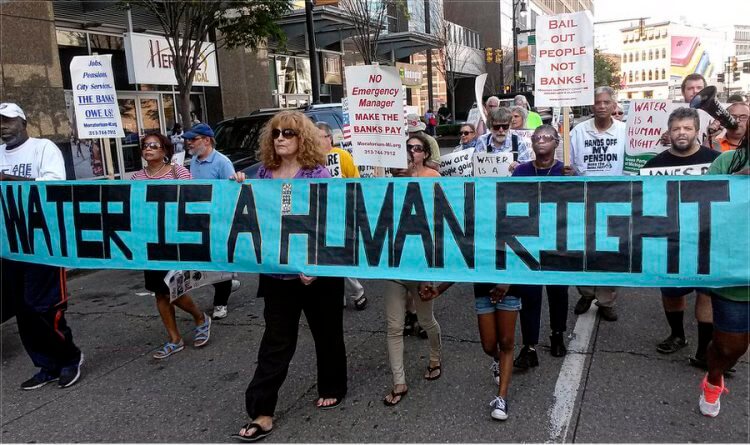Running water and health care are not luxuries. But when governments like Detroit's deny their citizens basic necessities such as water, what can we do but offer financial relief?
This article was made possible because of the generous support of DAME members. We urgently need your help to keep publishing. Will you contribute just $5 a month to support our journalism?
On Saturday night, several days after I signed up with the Detroit Water Project to pay a Detroit resident’s outstanding water bill, I got my “match.” The DWP, founded by Kristy Tillman and Tiffani Ashley Bell in response to mass water shut-offs, provides registered donors with the account numbers of people who have asked for help, allowing for direct payment of their overdue bills. It’s one of those little miracles of the internet age, connecting strangers who would never otherwise meet.
As I typed my credit card number into the Detroit Water and Sewerage Department’s payment form, knowing it would relieve a little bit of stress for someone who’s struggling, I felt my heart swell with an emotion that’s increasingly familiar to me these days. It wasn’t happiness, or love for my fellow man, or even the selfish glow that comes with relatively easy generosity. It was more … what’s the word I’m looking for?
Oh, yes: Resentment. I fully resented paying that water bill.
What’s more, I resent all of the crowd-funding requests I encounter on social media—to defray friends’ and strangers’ astronomical medical bills, or offer help with rent and food during tough times, or subsidize worthy artistic projects. I’ve ponied up for all of the above, but resented it every time.
You’ll note I didn’t say I resent the people who ask for such help. What I actually resent is the situation we’ve gotten ourselves into, as a nation, where a substantial portion of the voting public and our elected representatives believe that things like running water and health care—let alone arts funding—are luxuries some of us can do without.
It’s true that in many countries, people do without these things and countless others that even the poorest Americans take for granted. But I can’t help noticing that those who think it’s only fair to shut off citizens’ water if they can’t pay their bills, or deny preventative care and advanced treatments to individuals who can’t afford exorbitant insurance premiums, are very often the same people who boast that America is the greatest country in the world.
Citizens who proudly pledge allegiance to the flag, the republic, and the ideal of liberty and justice for all, vote for representatives loyal only to the interests of their wealthiest campaign donors. Politicians who make speeches about the exceptional nature of this country—our love of individual freedom and opportunity, in particular—take every chance to make life harder on people with the fewest resources, ensuring that they never have a viable shot at the American dream. Those same politicians promote a fear of “big government” when it comes to single-payer health care, universal day care, or a living wage, yet are happy to let the state interfere in citizens’ reproductive health-care decisions, collect our private correspondence, take naked images of us, incarcerate the poor, and abuse those they’ve locked up.
In other words, it’s precisely the opposite of liberty and justice for all. It’s government intrusion in all the wrong places, and let-them-eat-cake neglect of citizens who need laws and policies that would prevent their abuse, exploitation, and ill health.
How can we be the greatest country in the world, if the majority of us refuse tax increases and demonize social welfare programs, while some parents are choosing between paying their water bills and feeding their children? Or when millions have been forced into bankruptcy because of accidents and illnesses? How can people claim, straight-faced, that the USA is the best place to live, while we refuse to address widespread poverty in a meaningful way?
Unlike many Americans, I truly live here by choice; I also hold citizenship in a country that offers single-payer health care and a host of other social programs (which are being gutted a tad more slowly by their conservative politicians). I could leave. I did leave, for a decade of my adult life. But I came back to the U.S. because it is the country that feels like home to me. I grew up here, and I love the land and the people and the Constitution and the idea of America very much.
I love this country, and I can’t stand this country.
I love that when thousands of people have their water shut off, two committed individuals can figure out how to connect them with thousands of others who are willing to chip in. But I still can’t stand that it’s a country where factories close and jobs vanish and cities go bankrupt and essential services are taken away, one after another–and the rest of us act as though the real problem is poor people’s lack of personal responsibility.
I love that when a friend of mine needs expensive medical care, a social media push can raise the necessary funds in a matter of days. And still, I hate that people in my country must make their medical information public, and prostrate themselves before friends of friends at an already stressful time, because my fellow Americans would rather pay outrageous insurance premiums than extra taxes.
I love that neighbors and schools and churches and communities will often pitch in when one of their own needs help, but I wish that scaled to the national or even state level.
As it is now, I’ll continue to live in this land that I love, and help my fellow citizens when I can. But I’ll still resent spending every dollar on private charity that could have gone toward the good of us all.
